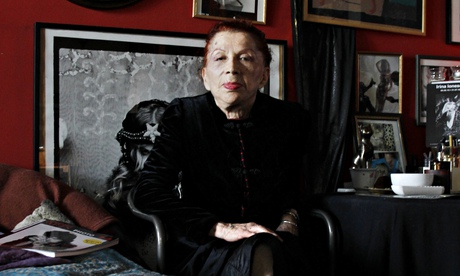
A French rentrée – the return to work after the summer break, and the start of the literary season – would be incomplete without a colourful cultural scandal. And the annual publishing spat erupted on cue last week when French-Romanian photographer Irina Ionesco – notorious for taking provocative erotic pictures of her young daughter Eva – sued her son-in-law for invasion of privacy, and lost.
Ionesco, 84, objected to seven passages in Simon Liberati’s novel Eva, inspired by and dedicated to his wife, Eva Ionesco, claiming they were “an attack on her dignity”. On Friday a judge threw out her demand for €40,000 and a legal order which would have forced publishers to withdraw and pulp the 15,000 copies already on their way to bookshops, a move the author’s lawyer described as tantamount to the “death of a novel”. The court ruled that, while certain of the contested 69 lines concerning Irina Ionesco’s origins – her parents came to France from Romania – and “her health, her hygiene, her love life and her income”, according to Le Monde, could be deemed an invasion of privacy, much of the information was already in the public domain. Indeed, some had been put there by Ionesco herself in 2004 in her own autobiographical novel, L’oeil de la poupée (The Doll’s Eye). The ruling is unlikely to spark a reconciliation between mother and daughter, who have engaged in a bitter settling of scores for nearly 40 years.
Irina Ionesco, who is no relation to the playwright Eugène Ionesco, is best known for the sexually provocative “Lolita” photographs she took of Eva between the ages of four and 12. The girl became the youngest model ever to appear in Playboy, featuring in the Italian edition at the age of 11 in October 1976. One of her most outrageous pictures of Eva appeared on the cover of Der Spiegel on 23 May 1977, but has since been expunged from the German magazine’s archives. Ionesco also made films starring her daughter – claiming that, like her photographs, they were done in the name of art.
Eva, now 50, an actress and film director, claims she was deeply traumatised by her childhood and was left with an ingrained sense of having been exploited for supposedly “artistic” ends. In 2011 she directed an autobiographical film called My Little Princess, with Isabelle Huppert playing an Irina-like figure, which explored her relationship with her mother and the eternal debate over the line between artistic freedom, pornography and sexual exploitation.
Eva told L’Express magazine of the film: “I told a monstrous story, but like a fairytale. My mother made nude photos of me which were sometimes impossible to show [to anyone]. I coloured up things [in the film] because the truth is too trashy.” She added: “My mother and I now only speak through our lawyers. It’s like a Greek tragedy.”
Irina argues that the 1970s was a permissive era with different mores, and has accused her daughter of colluding in the publication of the photographs whenever she has been offered payment, which Eva denies.
In December 2012 Irina Ionesco was ordered to pay €10,000 in damages and compensation for breaching her daughter’s privacy and copyright, and was ordered to hand over certain negatives of pictures of Eva.
Eva’s lawyer argued that artistic freedom came second to the “horrors” of the photographs. Irina’s lawyer claimed her daughter was motivated by “hate” of her mother, and argued that the 1970s were a more “liberal and permissive era”.
In May this year the Paris appeal court banned the photographer from “exhibiting, selling or transmitting” images of her daughter without her consent, and ordered her to pay €70,000 in damages.
Then Irina sued her son-in-law, Liberati, who won the Femina prize in 2011 for his book Jayne Mansfield 1967. His latest novel, his fourth, is tipped to be a literary success. It tells of his meeting Eva again in 2013, having already crossed her path as a young woman in Parisian nightclubs. “One winter’s evening in 1979, somewhere in Paris, I came across a 13-year-old ‘woman’ who already had a terrible reputation,” writes Liberati.
“Twenty-five years later she inspired my first novel, even though I knew nothing more about her than a paparazzi photo. Much later still, she happened to find me when I was lost in the meanders of life… and she, this little fairy who popped up from a shady underworld, saved me from the labyrinth and gave me the urge to love again. Unbelievably, her name is Eva, this book is a testament to her. SL.”

